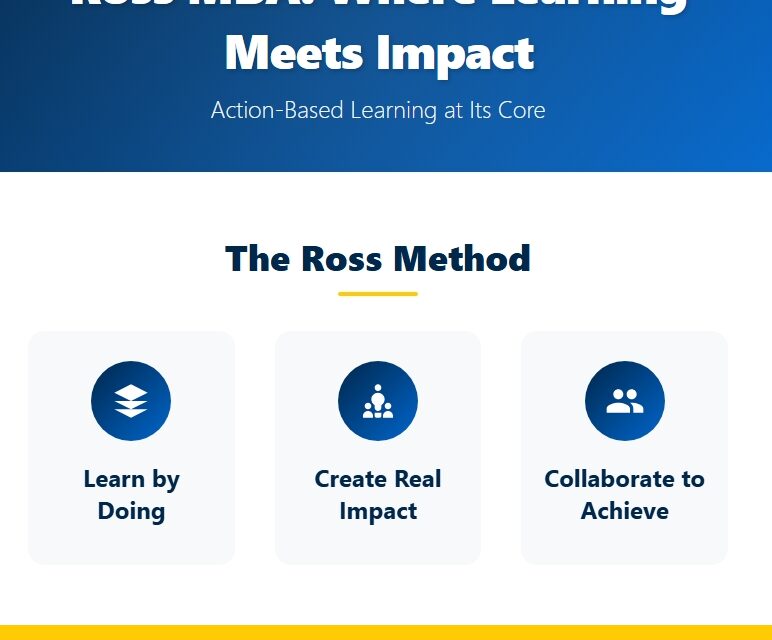The University of Michigan Ross School of Business doesn’t just want another high-achieving professional in their MBA program—they want future leaders who will embody their mission of “Building a Better World Through Business.” With acceptance rates remaining highly competitive, your essays serve as the critical bridge between your professional achievements and your potential to thrive in Ross’s unique Action-Based Learning environment.
⚡BEFORE YOU WRITE YOUR ESSAYS
Strong GMAT scores are crucial for Ross MBA admission. Start your GMAT prep with our free resources including 15+ hours of video lessons, 400 practice questions, and a full-length adaptive mock test. Get your baseline score today!
Here’s the reality: your essays often determine whether your application moves from the “maybe” pile to the “yes” pile. This guide will show you exactly how to craft essays that not only meet Ross’s requirements but position you as an ideal candidate they can’t wait to welcome to Ann Arbor.
⭐ Key Takeaways for Your Ross MBA Essays:
- Make Action-Based Learning central to every essay: Demonstrate specific knowledge of programs like MAP and REAL, and articulate exactly how these hands-on experiences will advance your career goals.
- Avoid generic, resume-rehashing essays: Every response should reveal new insights about you while connecting back to ABL philosophy, not superficial name-dropping that could apply anywhere.
- Show authentic alignment with Ross’s five core values: Use specific examples that demonstrate cultural fit across the five core values- Connect & Collaborate, Learn & Grow, Do Great Things, Trust & Empower, and Inclusion & Diversity.
- Why Ross MBA Essays Are Different (And What That Means for You)
- Your 2025-2026 Ross MBA Essays Blueprint: Requirements and Strategic Approach
- Decoding Ross’s Five Core Values: Your MBA Essay Integration Guide
- Your Ross MBA Research Strategy: Going Beyond Surface-Level Knowledge
- The Ross MBA Essay Success Formula: Avoiding Fatal Mistakes
- Your MBA Essay Planning Checklist: From Start to Submission
- Your Path to Ross MBA Application Success: Key Takeaways
- Frequently Asked Questions about Ross MBA Program
Why Ross MBA Essays Are Different (And What That Means for You)
Unlike programs that focus solely on academic metrics or ask generic “Why MBA?” questions, Ross essays are designed around their Action-Based Learning (ABL) philosophy. This isn’t just admissions jargon—it’s a fundamental difference that should shape every sentence you write.
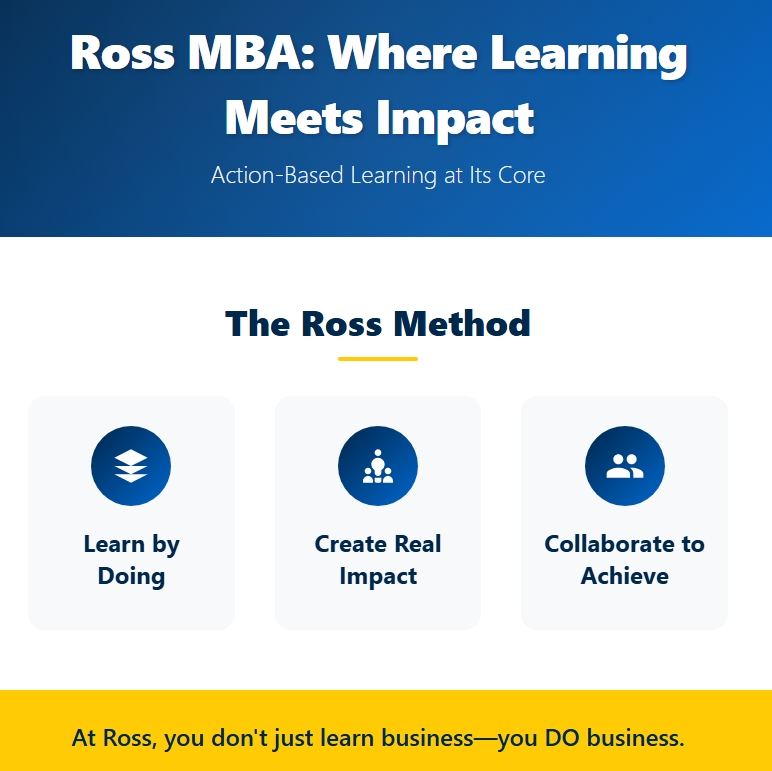
What makes Ross unique:
- They want to understand specifically how their hands-on approach will accelerate your trajectory
- They’re deeply interested in “who you are and what drives you” beyond professional achievements
- They expect you to demonstrate knowledge of programs like MAP (Multidisciplinary Action Projects) and REAL (Ross Experiences in Action-Based Learning)
- They value collaborative impact over individual achievements
This fundamental difference means your essays must do more than showcase accomplishments—they must demonstrate cultural fit with Ross’s collaborative, action-oriented environment.
Your 2025-2026 Ross MBA Essays Blueprint: Requirements and Strategic Approach
Ross MBA Application Deadlines
| Round | Application Date | Decision Date | Notes |
| Round 1 | September 8, 2025 | December 5, 2025 | ⭐ Best for career switchers |
| Round 2 | January 5, 2026 | March 13, 2026 | ⚡ Most competitive round |
| Round 3 | March 23, 2026 | May 1, 2026 | ⚠️ Limited spots available |
❓Planning for Round 1?
Don’t leave your GMAT prep to chance. Our AI-powered Personalized Study Plan creates a custom roadmap to your target score, factoring in your timeline and current abilities. Get your 10-minute personalized plan now!
Required Essay #1: Career Aspirations (300 words)
Prompt: “What is your short-term career goal, and how will Ross’ philosophy in Action-Based Learning help you achieve it? Please be specific. Please answer both parts of this question.”
What Ross is really asking: This isn’t just about your career goals—it’s about your understanding of their Action-Based Learning philosophy and your ability to connect it specifically to your trajectory.
Strategic approach:
- First 100 words: Clear, specific short-term goal with timeline
- Next 150 words: Demonstrate deep knowledge of Ross’s ABL approach
- Final 50 words: Connect ABL to your success in achieving your goal
➡️ Example framework: “My short-term goal is to transition into strategy consulting at McKinsey within 18 months of graduation, focusing on healthcare transformation projects. Ross’s Action-Based Learning philosophy will accelerate this transition through three key mechanisms: [specific MAP examples], [specific REAL experiences], [specific collaborative projects]. This hands-on approach will provide the client-ready skills that traditional case-study programs cannot match.”
Required Essay #2: Personal Impact and Character (200 words)
Prompt: “Michigan Ross is proud to support a community of leaders and impact makers. As a future member of this community, we want to know more about who you are and what drives you. Please choose 1 of the following prompts:“
| Question | What Ross is really asking | When to Choose |
| 1 | What makes you unique? | ⭐ Choose if you have a distinctive background or perspective that will enrich classroom discussions |
| 2 | Can you provide a specific example of how you’ve overcome a personal challenge? | ⚡ Choose if you can demonstrate resilience and self-awareness through a compelling challenge |
| 3 | What makes you excited to get up each morning? | ➡️ Choose if you can connect your genuine passions to your MBA goals and Ross community |
| 4 | Describe a time when you made a difference in your community or with an individual. | ↗️ Choose if you have a strong community impact story that shows initiative and leadership |
Optional Essay: Strategic Weakness Management (250 words)
Prompt: “Is there something in your resume or application that needs a brief explanation?“
When to use this essay:
- Employment gaps longer than 3 months
- Significant career pivots without clear connection
- Academic inconsistencies (low GPA, failed courses)
- Personal circumstances affecting performance
Strategic approach: Address the issue directly, focus on learning/growth, connect to your readiness for Ross.
Decoding Ross’s Five Core Values: Your MBA Essay Integration Guide
Understanding and demonstrating alignment with Ross’s values is crucial, but most applicants struggle with how to actually incorporate them. Here’s your actionable framework:
| Core Value | Essay Integration | Specific Examples |
| 1. Connect & Collaborate | ⚙️ Highlight team achievements over individual wins. Use phrases like “we achieved,” “our team delivered,” “together we solved.” | 1. Cross-functional project leadership 2. Conflict resolution 3. Building consensus across stakeholders |
| 2. Learn & Grow | ↗️ Frame challenges as learning opportunities. Show intellectual curiosity and adaptation. | 1. Skill development initiatives 2. Feedback incorporation 3. Pivoting strategies based on new information |
| 3. Do Great Things | ⚡ Quantify impact and scale. Show ambition matched with execution capability. | 1. Revenue growth 2. Process improvements 3. Social impact metrics Innovation outcomes |
| 4. Trust & Empower | ⭐ Demonstrate how you’ve empowered others and earned trust through reliability. | 1. Delegation successes 2. Mentoring outcomes 3. Trust-building in challenging situations |
| 5. Ensuring Every Community Member Thrives | ✅ Show commitment to inclusive environments and supporting others’ success. | 1. Diversity initiatives 2. Supporting underrepresented colleagues 3. Creating inclusive team cultures |
Your Ross MBA Research Strategy: Going Beyond Surface-Level Knowledge
Simply mentioning Ross programs by name won’t impress admissions officers—they want to see that you understand how these opportunities will specifically advance your career goals. Here’s your roadmap to research that will make your essays stand out.
Deep-Dive Ross MBA Program Research: What You Need to Know
Multidisciplinary Action Projects (MAP): Your Consulting Boot Camp
MAP is a seven-week intensive bootcamp where you’ll work in teams of 4-5 students from different backgrounds to solve real business challenges. Recent projects include helping Ford develop electric vehicle charging strategies and supporting tech startups with go-to-market strategies.
Research Strategy: Review recent project examples on the MAP website.
❌ Don’t just say “MAP will give me consulting experience.”
✅ Instead: “Through MAP, I’ll gain cross-functional team leadership experience while working on strategic challenges similar to those I’ll face as a consultant at [specific firm]. The seven-week timeline will teach me to deliver high-impact recommendations under tight deadlines.”
Ross Experiences in Action-Based Learning (REAL): Your Entrepreneurship Playground
REAL encompasses multiple hands-on opportunities:
- Venture Accelerator Program: 12-week intensive for launching startups with real funding
- Corporate Collaborations: Direct work with companies like Google, Amazon, or General Motors
- Investment Management: Manage real money through student-led funds
- Social Impact Projects: Partner with nonprofits and social enterprises
Research Strategy: Identify which REAL track aligns with your goals and research specific recent outcomes.
Specialized Centers and Institutes
Zell Lurie Institute for Entrepreneurship: A full ecosystem supporting student ventures with mentorship, funding (Wolverine Venture Fund), and connections to Michigan’s startup community. Recent student ventures have raised millions in funding.
Impact Studio: Helps local Detroit and Ann Arbor businesses build resilience through student consulting projects.
Student-Led Investment Funds: Including Michigan Clean Venture Fund (sustainable technology) and Wolverine Venture Fund (student/alumni ventures). These provide real money management experience with sector-specific focus.
Actionable Research Tactics
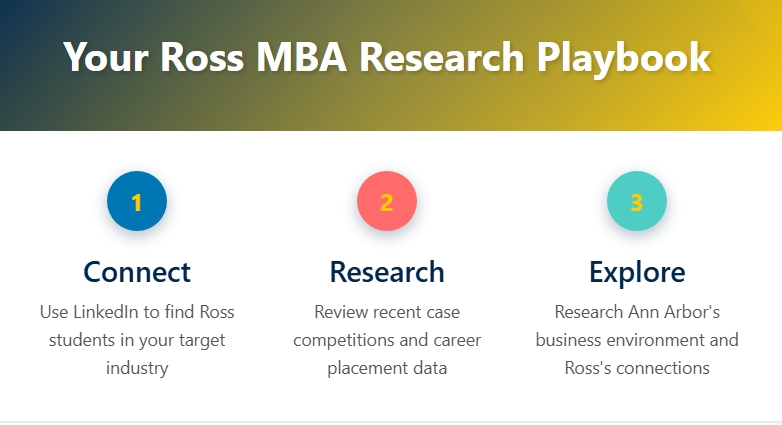
1. Connect with the Ross Community
- Use LinkedIn to find Ross students in your target industry
- Attend virtual information sessions with specific questions
- Reference conversations: “During my discussion with [Name], a current Ross student in the Corporate Strategy Club, I learned about…”
2. Dive into Ross-Specific Content
- Read Ross Student Stories blog for authentic experiences
- Follow Ross professors on LinkedIn for latest research
- Review recent case competitions and career placement data
- Study the Ross Career Reports for your target field
3. Understand the Broader Ecosystem
- Research Ann Arbor’s business environment and Ross’s connections
- Learn about partnerships with broader University of Michigan resources
- Understand unique location advantages (Detroit revitalization, automotive industry)
How To Demonstrate Genuine Fit in Your Ross MBA Essays?
| Example | Approach | Key Elements |
| “I want to participate in MAP to gain consulting experience.” | ❌ Generic | Vague, lacks specificity and personal connection |
| “Through MAP, I’ll apply my AI background to help companies navigate digital transformation, similar to recent projects with Ford’s mobility division. This directly prepares me for technology consulting at McKinsey Digital, bridging technical innovation and business strategy.” | ✅ Specific | ➡️ Specific background connection, concrete examples, clear career trajectory |
| “Ross’s entrepreneurship resources will help me start a business.” | ❌ Generic | Generic statement without detailed knowledge |
| “The Zell Lurie Institute’s Entrepreneur-in-Residence program will provide mentorship to refine my EdTech startup concept, while the Wolverine Venture Fund could provide seed funding for a pilot program. This ecosystem approach—mentorship, funding, and peer collaboration—is exactly what I need to move from idea to execution.” | ✅ Specific | ⭐ Specific program names, detailed research, strategic approach |
✅ Learn more about how to select target business schools based on personal and professional fit- Shortlisting Business Schools That Fit You The Best
Ross MBA Essays: Research Verification Checklist
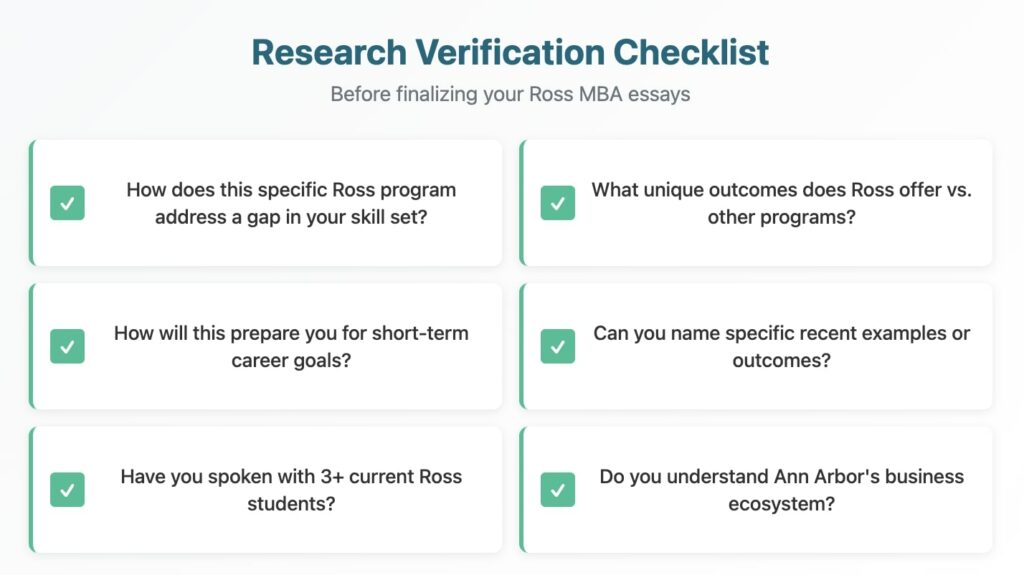
The Ross MBA Essay Success Formula: Avoiding Fatal Mistakes
Common Fatal Mistakes (And How to Avoid Them)
| Common Mistake | Problem Description | Solution |
| The Generic Trap | ⚠️ If you can replace “Ross” with “Wharton” and your essay still works, start over. | ⚙️ Use specific Ross program names, professor references, recent initiatives |
| Resume Rehashing | ❌ Your essays should reveal new information, not repeat your CV. | ℹ️ Use the 70/30 rule—70% new insights, 30% resume context |
| Ignoring Action-Based Learning | ⛔ Every essay should somehow connect to ABL philosophy. | ❓ Ask yourself “How does this example show my readiness for hands-on learning?” |
⭐ The Ross Authenticity Test: Ask Yourself
- Does this essay reveal something unique about me?
- Have I demonstrated specific knowledge of Ross programs?
- Would Ross admissions officers see me as someone who will thrive in their collaborative environment?
- Have I quantified my impact wherever possible?
Your MBA Essay Planning Checklist: From Start to Submission
Phase 1: Foundation (Days 1-30)
Week 1-2: Deep Ross Research
- Read 10 recent Ross news articles
- Connect with 3 current students/recent alumni
- Identify 5 specific programs relevant to your goals
- Research 2 professors in your area of interest
✅ Week 0: GMAT Strategy
Before diving into Ross research, ensure your GMAT score will make you competitive. Our Personalized Study Plan tool helps you map out exactly how to reach that target 720+ score Ross expects. Create your custom GMAT roadmap in just 10 minutes!
Week 3-4: Self-Reflection and Story Development
- Complete the Ross values alignment exercise
- Identify 10 significant experiences from your background
- Draft your “elevator pitch” connecting past-MBA-future
- Quantify impact for all major achievements
Phase 2: Writing and Review (Days 31-60)
Week 5-6: First Drafts
- Write Essay #1 focusing on ABL connection
- Write Essay #2 showcasing authentic self
- Draft optional essay if needed
Week 7-8: Peer Review and Revision
- Get feedback from 3 different perspectives
- Revise for Ross-specific elements
- Ensure cohesive narrative across essays
Phase 3: Polish and Submission (Days 61-90)
Week 9-10: Final Refinement
- Professional editing review
- Final Ross connection verification
- Authenticity and impact check
Week 11-12: Submission Preparation
- Format verification
- Word count confirmation
- Final submission review
Your Path to Ross MBA Application Success: Key Takeaways
Crafting compelling Ross MBA essays requires more than strong writing—it demands genuine self-reflection, thorough research, and strategic positioning around their Action-Based Learning philosophy.
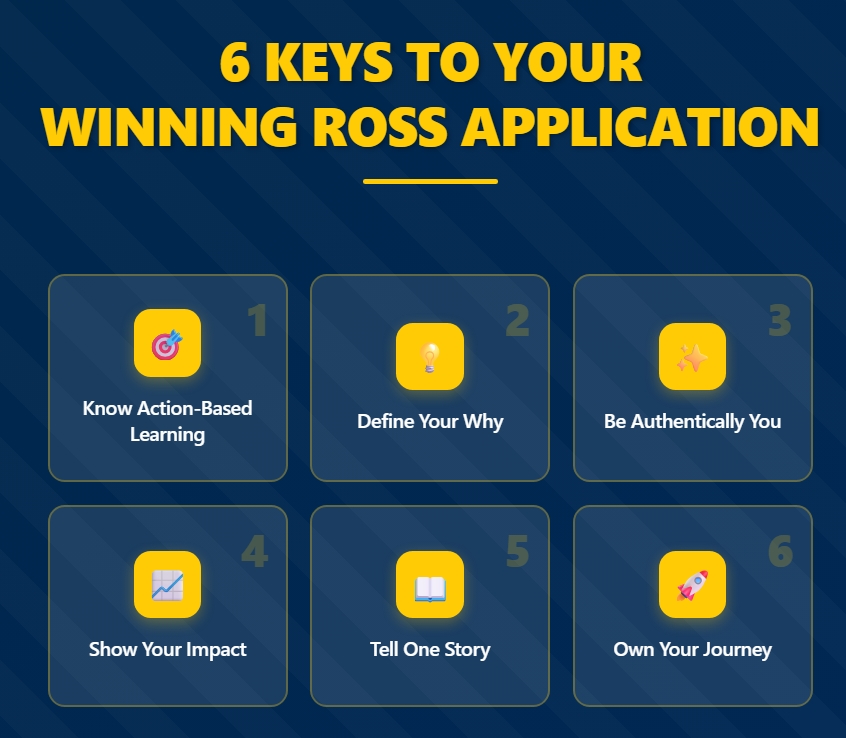
Your Success Framework:
- Demonstrate genuine fit with Action-Based Learning through specific program knowledge
- Be specific about how Ross will help you achieve clearly defined goals
- Show authenticity by sharing genuine experiences that reveal character
- Quantify impact wherever possible with specific numbers and outcomes
- Create narrative cohesion across all application components
- Address weaknesses strategically and honestly when necessary
- Start early to allow time for deep reflection and thorough revision
The most successful Ross applicants aren’t necessarily those with perfect resumes, but those who can clearly articulate their vision, demonstrate cultural fit, and show genuine excitement about contributing to the Action-Based Learning community.
Ready to start? Begin with thorough self-reflection using our framework above, dive deep into Ross’s programs and culture, and remember: authenticity combined with strategic positioning is your path to Ann Arbor.
⚡ Framework Step 0: Nail Your GMAT
Even the most authentic essays can’t overcome a weak GMAT score. Start with our comprehensive free resources: 400+ practice questions, detailed video lessons, and AI-driven feedback. Begin your GMAT success story here!
Frequently Asked Questions about Ross MBA Program
The Class of 2026 achieved a record-breaking average GMAT score of 728, with the middle 80% range falling between 690-760. While Ross doesn’t state a minimum GMAT requirement, competitive applicants typically score 710+.
For GRE takers (39% of admits), the average scores are 162 Quantitative and 159 Verbal, roughly equivalent to a 322 combined score. Ross employs holistic admissions, meaning test scores are just one factor among many. Higher scores are generally recommended for over-represented demographics. The program has seen consistent score increases over recent years, reflecting growing competitiveness.
The Class of 2024 reported an average starting salary of $159,934, down slightly from $162,946 in 2023. Industry-specific averages vary significantly:
Consulting: $180,948 (highest)
Financial Services: $162,023
Technology: $156,066
Healthcare: $138,486
Consumer Packaged Goods: $122,643
When including signing bonuses (median $30,000, with 86% receiving bonuses), total compensation packages approach $200,000. The slight salary decrease reflects broader economic challenges in the 2024 MBA job market, though Ross graduates maintain strong compensation levels compared to peer schools.
The Class of 2026 acceptance rate was approximately 29%, calculated from 4,036 applications for 396 seats. This represents a dramatic increase in selectivity driven by a 36% surge in applications rather than reduced class size.
Historical acceptance rates ranged 20-37% over the past five years. The 2023-2024 cycle saw record-breaking application volumes as part of the broader post-COVID MBA application surge across top schools. Ross maintains consistent class sizes while experiencing increasing demand, making admission increasingly competitive. The school employs holistic review, considering all aspects of candidacy beyond just statistics.
The Class of 2026 has an average GPA of 3.42, with no stated minimum GPA requirement. Ross explicitly encourages applications “regardless of your GPA,” emphasizing holistic admissions review.
The student body represents diverse academic backgrounds: 38% STEM degrees, 39% Business degrees, and 23% Humanities degrees. Notably, 22% are first-generation college students, demonstrating the school’s commitment to diversity. While a competitive GPA helps, Ross evaluates academic readiness through multiple factors including work experience, leadership potential, and quantitative skills demonstrated through test scores or alternative methods. Strong professional achievements can offset lower GPAs in the holistic review process.
Michigan Ross holds strong positions across major 2024 rankings:
U.S. News: #8 (up from #10)
Bloomberg Businessweek: #8 (up from #15)
Fortune Part-Time MBA: #2
The Executive MBA ranks #7 in U.S. News and #4 in Fortune. The Online MBA achieved #6 in U.S. News, its highest ranking since launching in 2019. Ross also ranks #2 for Best MBA Programs for Entrepreneurship and #1 for Best Administered MBA Program. However, Ross dropped from Financial Times’ 2024 global ranking due to insufficient alumni survey responses, not performance issues. These consistently top-10 rankings reflect Ross’s strength in academic quality, career outcomes, and program management.
Yes, multiple pathways exist to apply without GMAT:
Test Waiver Request: For experienced, high-performing candidates with decisions within 10 business days
Quantitative Readiness Course (QRC): Free online course requiring 80%+ on the final exam
Other standardized tests: GRE (used by 39% of admits), MCAT, LSAT, PCAT, DAT, or Executive Assessment for those with 8+ years experience
Statement of Academic Readiness: Demonstrating quantitative skills
Approximately 20% of the current class was admitted without standardized test scores. Scholarship eligibility remains unaffected by test-optional admission. However, some recruiters may still request scores during hiring.
You can learn about the full time MBA application requirements here for Ross.
The Class of 2024 achieved a median base salary of $170,000, higher than the average of $159,934, indicating some lower-paying positions pull down the mean. By industry, median salaries are:
Consulting: $185,000 (highest)
Financial Services: $175,000
Technology: $157,205
Healthcare: $137,250
Consumer Packaged Goods: $125,000
The median signing bonus is $30,000, bringing total median compensation to approximately $200,000. Geographic location significantly impacts salary, with San Francisco Bay Area averaging $168,874 and international positions $126,334. The 2024 median represents a slight decrease from 2023’s $175,000, reflecting broader economic challenges while maintaining strong absolute compensation levels.
The full-time MBA program is 2 years (24 months) requiring 57 credit hours in a traditional residential format. No accelerated options are available for the full-time program. Other formats offer different timelines:
Weekend MBA: 2 years while working
Executive MBA: 21 months with monthly weekend sessions
Online MBA: Flexible 2.5-3 years average, with 2-5 year completion window
Dual degree options like the MBA/MS through Erb Institute extend to 2.5-3 years. The standard 2-year structure includes signature experiences like MAP (Multidisciplinary Action Projects), student-led investment funds, and global opportunities across 20+ countries. For detailed information about program structure and curriculum, explore the various formats available.
Ross MBA has partial STEM designation through its Specialization in Management Science, not full program designation. Students must complete 14 credit hours of STEM-designated courses from options including Business Analytics, AI for Business, Marketing Engineering, and Valuation. This specialization requires no additional credits beyond the standard 57 hours or extra tuition.
Graduates who complete this specialization qualify for the 24-month STEM OPT extension, providing 36 total months of U.S. work authorization (12 standard + 24 STEM). Unlike schools with full STEM designation, Ross students must actively choose and complete this specific track. The specialization was broadened in 2020 to increase accessibility for international students seeking extended work opportunities.
You can learn about the STEM MBA programs here- What is STEM MBA Program .


